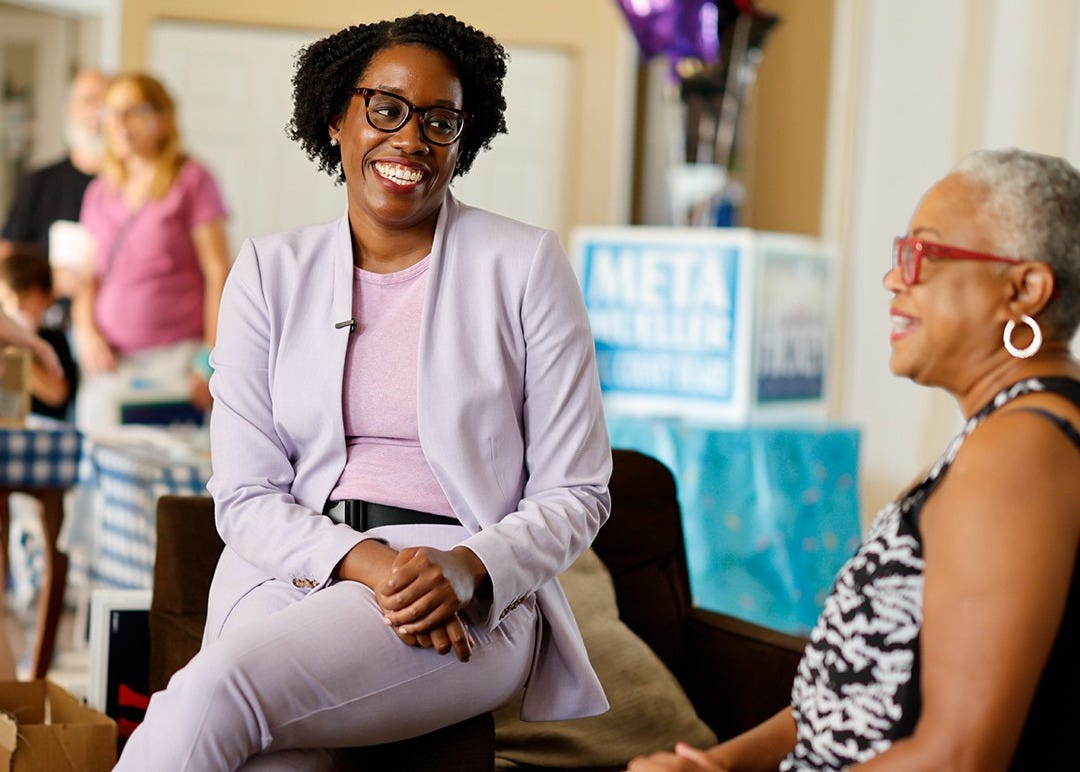Morning Digest, sponsored by Ripple on Impact: Our top five questions as the first fundraising quarter wraps up
Early money often sets the stage for future success

Leading Off
1Q Fundraising
The first fundraising quarter of the 2026 election cycle comes to an end on Monday evening, giving us our first hard data about which candidates for the House and Senate are—or are not—bringing in the kind of money they need to win.
Politicos have long understood the importance of a candidate's opening haul in convincing future donors that the campaign can win and is worth investing in. It's no accident that the name of the influential pro-choice group EMILYs List is an acronym for "Early Money Is Like Yeast" because "it makes the dough rise."
A message from our sponsor, Ripple On Impact:
Guaranteed 110% ROI: Transform Your Fundraising with Data-Driven Strategies
With millions of donor contacts, we can help you find the right donors for your campaign or cause, but we don’t stop there. If a rental does not reach full return within 48 hours, additional messages are sent at no extra cost.
A strong initial burst can also help candidates win over powerful endorsements and deter potential rivals from running, while underwhelming numbers can have precisely the opposite impact.
Candidates must file reports disclosing all financial activity between Jan. 1 and March 31 with the Federal Elections Commission by April 15, though campaigns with strong hauls often leak their numbers early to generate attention. (Candidates for non-federal office submit disclosures to state or local officials and often operate under a different set of deadlines.)
Each quarter, The Downballot collects the most relevant data for all congressional candidates in two charts, one each for the House and Senate. We'll release those soon after the reporting deadline.
But as we wait to pore over fundraising numbers for revealing details, such as whether previously unheralded candidates have raised strong sums, here are several specific questions we'll be eager to answer:
1) Which Democrat in Illinois' House delegation starts off ahead in the Senate primary?
Reps. Robin Kelly, Raja Krishnamoorthi, and Lauren Underwood are all considering running for the Senate in the likely event that Sen. Dick Durbin, a fellow Democrat, retires. Federal law allows House candidates to transfer their war chests to a Senate campaign, so even though this trio has yet to announce a bid, first-quarter reports will show how they compare financially ahead of what will be an expensive primary.
Several other Illinois Democrats, including Lt. Gov. Juliana Stratton, are also hoping to replace Durbin. Federal law, however, prohibits candidates from transferring funds from a state or local campaign to a federal account, so they'd be starting their fundraising efforts from scratch.
2) Do early launches set two Minnesota Democrats above the rest?
Lt. Gov. Peggy Flanagan launched her campaign for the Senate on the day that Democratic incumbent Tina Smith unexpectedly announced her retirement in mid-February, while former state Sen. Melisa Lopez Franzen entered the race a month later. Potential rivals will be watching their opening numbers closely.
Two of those possible opponents, Democratic Reps. Angie Craig and Ilhan Omar, are considering Senate bids as well, and their first-quarter hauls may offer clues about their plans. However, either representative could also use anything they raise to seek reelection. Craig holds a light-blue seat that Republicans have targeted in the past, while Omar has gone through several expensive primaries.
3) Will a Louisiana hardliner scare off other primary challengers to a GOP incumbent?
State Treasurer John Fleming announced in December that he'd wage a primary challenge against Sen. Bill Cassidy, who voted to convict Donald Trump following the Jan. 6 attack on the U.S. Capitol, but he barely raised anything during the remainder of the year—admittedly a slow fundraising period. Several other Louisiana Republicans are considering joining the race, but a good quarter from Fleming could allow him to present himself as Cassidy's main opponent.
4) Does fundraising back up an ailing Democrat's claim he'll seek reelection?
Georgia Rep. David Scott insists he's seeking a 13th term even though concerns about his health cost him his role as the top Democrat on the Agriculture Committee earlier this year, but a weak haul would only intensify chatter that the 79-year-old won't run after all. (Scott is by no means the only elderly House Democrat worth keeping an eye on.) State Sen. Emanuel Jones says he's running for the safely blue 13th District no matter what Scott does, so this will also be our first look at his fundraising abilities.
5) How are House candidates doing early in top-tier races?
Several Democrats launched campaigns against vulnerable House Republicans early this year, so we'll be watching to see whether they open strong and scare off other intraparty opponents. One candidate we'll be paying close attention to is Wisconsin Democrat Rebecca Cooke, who is seeking to avenge her close loss last year to Republican Rep. Derrick Van Orden in the 3rd District.
Pulling together this newsletter every day is no mean feat! If you rely on the Morning Digest to keep you informed about down-ticket elections, please consider supporting us as a paid subscriber today. Thank you!
Judges
WI Supreme Court
The Wisconsin Supreme Court on Sunday evening unanimously declined to bar Elon Musk from paying $1 million to two voters in exchange for voting in Tuesday's pivotal election that will determine control of the court.
Democratic Attorney General Josh Kaul asked the courts to intervene on Friday after Musk tweeted the night before that he would "personally hand over two checks for a million dollars each in appreciation for you taking the time to vote" at an event in Wisconsin. Must later deleted the tweet and replaced it with one making the same million-dollar offer to two people "to be spokesmen" for his "petition in opposition to activist judges."
Kaul argued that Musk's first post violated state law, which "forbids anyone from offering or promising to give anything of value to an elector in order to induce the elector to go to the polls," and pointed out that Musk never said he had canceled his original giveaway plans.
Kaul's suit, however, was rejected by a trial court, the state Court of Appeals, and finally, in a brief order, the Supreme Court, just before Musk's event Sunday night in Green Bay. Musk proceeded to hand out $1 million checks to a pair of attendees.
Ballot Measures
LA Ballot
Voters dealt Louisiana Gov. Jeff Landry a major setback on Saturday when they resoundingly rejected four ballot measures backed by Landry and his fellow Republicans in the state legislature.
Landry's top priority was Amendment 2, a wide-ranging overhaul to the state constitution that critics charged would, among many other things, reduce state revenues and undermine education funding. Criminal justice reformers also vocally objected to Amendment 3, which would have allowed lawmakers to expand the list of crimes for which children can be charged as adults.
Amendment 1, meanwhile, would have let legislators establish new specialty courts, and Amendment 4 would have altered the timing of certain judicial elections. Neither appeared to attract much controversy, but both seem to have been swept up in the opposition to the two more high-profile amendments. Voters opposed all four by very similar margins, with the "No" side taking 64-66% in each case.
Mayors & County Leaders
Boston, MA Mayor
Developer Tom O'Brien, who'd reportedly been considering a challenge to Boston Mayor Michelle Wu, will join the race, reports Politico, with a launch likely this week. O'Brien has been tight-lipped about his plans, but the Boston Globe reported earlier this month that he "would be expected to run as a Democrat" in September's officially nonpartisan primary.
Wu already faces one notable opponent in former nonprofit head Josh Kraft, the son of New England Patriots owner Robert Kraft. Both Wu and Kraft are also Democrats.








A reminder: April Fool's jokes are prohibited on this site. This is a long-standing policy. Do not share or make any such jokes. And please be extra mindful tomorrow when sharing links, tweets, etc., because it's too easy to mistake a poorly executed "joke" for the truth. Thank you.
I wonder what would have happened if Attorney General Josh Kaul, instead of going to the courts, simply had Elon Musk arrested and detained? With so much at stake, and Musk clearly in violation of the spirit and letter of the law – in state after state – it surprises me that AG Kaul didn’t choose to play hardball. It’s high time somebody did!